|
|
|
Sort Order |
|
|
|
Items / Page
|
|
|
|
|
|
|
| Srl | Item |
| 1 |
ID:
174030
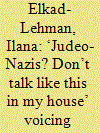

|
|
|
|
|
| Summary/Abstract |
This article demonstrates how experiences of voicing traumas in Israeli society are reflected in art through Ezekiel’s World, a graphic novel by Michael Kovner. The novel explores relations between Holocaust survivors and their children (and grandchildren), whose complexity embodies the moral significance of Holocaust memory for Israelis. Both generations are preoccupied with the Holocaust as an existential crisis that determines contrasting generational attitudes towards military service and the occupation, resulting in the sacrificing of children and conversely, the abandonment of parents. The polyphonic novel voices these interrelated traumas via intertextual relations between painting, narrative, poetry, and documentary.
|
|
|
|
|
|
|
|
|
|
|
|
|
|
|
|
| 2 |
ID:
183670
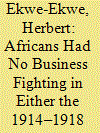

|
|
|
|
|
| Summary/Abstract |
The wars of 1914–1918 and 1939–1945 are without parallel in the expansive stretch of decades of the pan-European conquest and occupation of Africa in creating such profound opportunity to study the very entrenched desire by the European conqueror-states in Africa to perpetuate their control on the continent and its peoples indefinitely. The two principal protagonists in each conflict, Britain and Germany, were the lead powers of these conqueror-states that had formally occupied Africa since 1885. Against this cataclysmic background of history, Africans found themselves conscripted by both sides of the confrontation line in 1914–1918 to at once fight wars for and against their aggressors during which 1 million Africans were killed. Clearly, this was a case of double-jeopardy of conquered and occupied peoples fighting for their enemy-occupiers. In the follow-up 1939–1945 war, when Germany indeed no longer occupied any African land (having been defeated in the 1914–1918 encounter), Britain and allies France and Belgium (all continuing occupying powers in Africa) conscripted Africans, yet again, to fight for these powers in their new confrontation against Germany, and Japan, a country that was in no way an aggressor force in Africa. Hundreds of thousands of Africans were killed in this second war. In neither of these conflicts, as this study demonstrates, do the leaders of these warring countries who occupied (or hitherto occupied) Africa ever view their enforced presence in Africa as precisely the scenario or outcome they wished their own homeland was not subjected to by their enemies. On the contrary, just as it was their position in the aftermath of the 1914–1918 war, Britain, France, Belgium, Spain and Portugal in 1945 each envisaged the continuing occupation of the states and peoples of Africa they had seized by force prior to these conflicts. Winston Churchill, the British prime minster at the time, was adamant: ‘I had not become the king’s first minister in order to preside over the liquidation of the British Empire’. Charles de Gaulle, leader of the anti-German ‘free French forces’, was no less categorical on this score: ‘Self-government [in French-occupied Africa, Asia, the Caribbean, South America, the Pacific and elsewhere in the world] must be rejected – even in the more distant future’.
|
|
|
|
|
|
|
|
|
|
|
|
|
|
|
|
| 3 |
ID:
107331
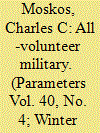

|
|
|
| 4 |
ID:
152319
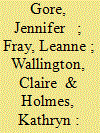

|
|
|
|
|
| Summary/Abstract |
Modern military organizations are making a concerted effort to recruit a more diverse range of people, with the role of women in the military at the forefront of debate. In Australia, in response to the changing role of the military and with the aim of positioning the military as an “employer of choice” for women, females are targeted as early as high school. Using data from a study of 6,492 Australian school students in Years 3–12, we examine student aspirations for military careers. Student aspirations were influenced by traditional perceptions of the military as a primarily masculine enterprise. Key reasons for student interest included dominant notions of masculinity, familial military experience, career options, and enlistment benefits. We argue that current views of the military among school children signal the need to shift such perceptions to appeal to a wider range of people and attract a more diverse workforce.
|
|
|
|
|
|
|
|
|
|
|
|
|
|
|
|
| 5 |
ID:
178795
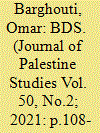

|
|
|
|
|
| Summary/Abstract |
Despite its military, diplomatic, and economic power, Israel’s regime of military occupation, settler colonialism, and apartheid still views the nonviolent, Palestinian-led global Boycott, Divestment, Sanctions (BDS) movement as a “strategic threat” to its system of injustice, waging a protracted war against the movement accordingly. This essay aims to contextualize Israel’s war on BDS by examining the movement’s origins, principles, impact, and theory of change. It analyzes the most critical challenges BDS is facing and its most promising strengths, especially its balancing of ethical principles with strategic effectiveness and its intersectional approach to the struggle for Palestinian freedom, justice, and equality.
|
|
|
|
|
|
|
|
|
|
|
|
|
|
|
|
| 6 |
ID:
182843
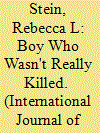

|
|
|
|
|
| Summary/Abstract |
Over the course of the first two decades of the twenty-first century, within the occupied Palestinian territories, photographic technologies and image-oriented politics would grow increasingly central as activist and human-rights tools of bearing witness to Israeli state and settler violence. This essay investigates the Israeli right-wing and international Zionist response to these Palestinian visual archives and their perceived threat. In particular, it tracks the rise and normalization of a repudiation script that impugned the veracity of these images, arguing that they were fraudulent or manipulated to produce a damning portrait of Israel. Drawing on post-colonial and settler-colonial studies, as placed into dialogue with digital media studies, the essay focuses on three cases studies of repudiation (2000, 2008, 2014, respectively) to consider how the long colonial history of repudiation in the Israeli context would be progressively updated by right-wing Israelis and their international supporters to meet the challenges posed by the smartphone age. By the second decade of the twenty-first century, the script had become an increasingly standard Zionist response to viral images of Palestinian death or injury at Israeli state or settler hands. Repudiation was thus marshaled as a solution to the viral visibility of Israeli state violence by bringing the otherwise damning images back into line with dominant Israeli ideology, a process of shifting the narrative from Palestinian injury to Israeli victimhood. The story of the “false” image of Palestinian injury endeavors strips the visual field of its Israeli perpetrators and Palestinian victims, thereby exonerating the state. Or such is the nature of this digital fantasy in the Israeli colonial present.
|
|
|
|
|
|
|
|
|
|
|
|
|
|
|
|
| 7 |
ID:
124743
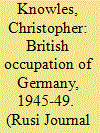

|
|
|
|
|
| Publication |
2013.
|
| Summary/Abstract |
Britain began to plan for the occupation and reconstruction of Germany following the end of the Second World War as early as 1944. However, such was the devastation as a result of intensive fighting that went all the way to Berlin that these plans were unsuited to the reality on the ground in May 1945. Christopher Knowles explores the first four years of 'benevolent occupation' in the British zone under the leadership of Field Marshal Montgomery and his successors, noting that positive effect was more likely where they created the conditions for the German people to act for themselves, rather than imposing solutions by force or decree.
|
|
|
|
|
|
|
|
|
|
|
|
|
|
|
|
| 8 |
ID:
079234
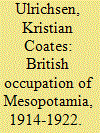

|
|
|
|
|
| Publication |
2007.
|
| Summary/Abstract |
During World War I the military campaign in Mesopotamia placed enormous demands on local man- and animal power to provide the logistical resources vital to its conduct. This required the British civil and military authorities to construct a wartime state apparatus that filled the administrative vacuum left by the retreating Ottomans and made possible its downward penetration and mobilisation of local resources for the war effort. This article examines the interaction of politics and logistics in Mesopotamia and views the enhanced wartime levels of resource extraction in light of the British attempts to codify their presence in the country after 1918 and the nationalist backlash that resulted.
|
|
|
|
|
|
|
|
|
|
|
|
|
|
|
|
| 9 |
ID:
098185
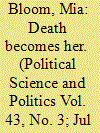

|
|
|
| 10 |
ID:
171676
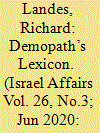

|
|
|
|
|
| Summary/Abstract |
This article examines a double discourse by the Palestinian leadership, one in English and one in Arabic, which plays a central role in their negotiating strategy with Israel since the onset of the Oslo ‘peace process’ (1993). Using language very close to Western terminology, Palestinians in English speak of ‘Occupation’ and ‘Settlements’ with the 1967 borders as the defining issue; while in Arabic, they speak of ‘Occupation’ and ‘Settlements’ in terms of the 1948 borders (i.e., all of Israel is an ‘Occupation’ and Tel Aviv is an illegal ‘settlement’). As a zero-sum negotiating strategy this makes perfect sense: convince Israel to concede ‘land for peace’ (1967 borders), when in reality this means ‘land for war’ (1967 borders as launching pad for war to 1948 borders). The western news media, allegedly committed to accurate reporting, shows no knowledge of the Arabic discourse and presents what Palestinians say in English as reliable reflections of their actions and intentions. As a result of this failure to identify the double-discourse, the Western legacy media presents Palestinian war propaganda as news to their Western audiences, unwittingly helping the Palestinians in their deception.
|
|
|
|
|
|
|
|
|
|
|
|
|
|
|
|
| 11 |
ID:
124778
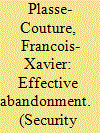

|
|
|
|
|
| Publication |
2013.
|
| Summary/Abstract |
Towards the end of 2012, a group of Israeli settlers and right-wing activists attacked an Israel Defense Forces (IDF) base on the West Bank. IDF soldiers and members of the Israeli Knesset had provided information to the attackers, who adopted a 'bring it on' tone that commentators described as echoing 'civil war'. As the occupation blurs the categories of inside/outside, what we are witnessing is a challenge to the traditional distinction between politics and war. Accordingly, we are moved to think in terms of the distribution and variable intensities of violence, rather than to accept simple debates about either the absence or presence of war or the monopoly of violence. This article seeks to examine the evolving relationship between the state and society in the wake of the so-called Arab Spring through an investigation of the relationship between neoliberalism and sovereign violence. It argues that 'price tag' actions perpetrated in the Occupied Territories and Israel are the effect of a neoliberal organization of power characterized by a form of governing by non-intervention, where the abandonment of certain parts of society produces the desired containment of elements considered undesirable to the body politic. This article challenges Weber's theory of state sovereignty as the monopoly of legitimate state violence, arguing instead that state apparatuses may in fact 'outsource' violence. We can understand this shift in the mode of operation of sovereignty by theorizing 'society' as the effect of warlike relations whereby particular tactics and strategies are employed as a way of organizing and policing forms of life necessary for the continuation of a particular body politic.
|
|
|
|
|
|
|
|
|
|
|
|
|
|
|
|
| 12 |
ID:
109957
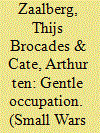

|
|
|
|
|
| Publication |
2012.
|
| Summary/Abstract |
This article examines the so-called 'Dutch approach' to conducting stabilisation operations. The term is mostly used in relation to the mission carried out by the Netherlands armed forces in Afghanistan's Uruzgan province from 2006 to 2010, but actually originates in the Iraqi province of Al Muthanna. Here, a 1350-strong battle group operated from July 2003 until March 2005 as part of the US-led coalition, after which the Dutch forces left Iraq relatively unscathed and self-confident of their ability in dealing with this type of conflict. On the basis of archival research and interviews, the authors unravel the 'Dutch approach' in southern Iraq by tracing its roots and by examining the Dutch operation in the context of the American and British experiences. They argue that despite predominantly effective tactical reflexes and an overall adequately broad interpretation by battle group commanders of a too narrowly defined political mandate, stability in Al Muthanna was conditions-driven rather than the result of a unique and effective approach. The term 'Dutch approach' turned out to be a convenient fabrication which, after the relatively successful mission in Al Muthanna, became increasingly politicised in the run-up to a dangerous new operation in southern Afghanistan.
|
|
|
|
|
|
|
|
|
|
|
|
|
|
|
|
| 13 |
ID:
154304
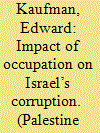

|
|
|
|
|
| Summary/Abstract |
The occupation of the Palestinian Territories is based on corruptive and corrupting practices that originate from and feed back into Israel.
|
|
|
|
|
|
|
|
|
|
|
|
|
|
|
|
| 14 |
ID:
142669
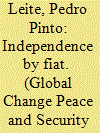

|
|
|
|
|
| Summary/Abstract |
Western Sahara and Timor-Leste (East Timor) are twin cases marking an incomplete end to the era of decolonization. The two are remarkably similar: they are former European colonies with peoples who had been promised self-determination only to be invaded within weeks of each other in late 1975 by neighboring states, themselves recently decolonized. Decades would pass while the international community stood by. The people of Timor-Leste eventually achieved freedom against the odds while most of Western Sahara and half the Saharawi people remain under foreign occupation, the scene of established human rights violations and the ongoing export of natural resources. For 25 years, Morocco has refused the Saharawi people a referendum, with the United Nations organization unable to respond as a result of a threatened veto by some permanent members of the Security Council. However, a Saharawi state arguably has come into being, enjoying popular legitimacy, governing institutions and accepted control over a part of Western Sahara. Moreover, regionally and within the African Union, the Saharawi Republic enjoys broad recognition and advocacy for its people. While drawing on lessons from the comparative experience of self-determination in Timor-Leste, this paper contends that the UN should follow the example of the African Union and welcome the Saharawi Republic as a member state. To achieve that result, a wider recognition among states is needed. The UN General Assembly, by employing its 1950 Uniting for Peace resolution, can decide to ‘consider the matter immediately' and compel a breakthrough which the Security Council has so far not been able to deliver.
|
|
|
|
|
|
|
|
|
|
|
|
|
|
|
|
| 15 |
ID:
167516
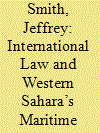

|
|
|
|
|
| Summary/Abstract |
Western Sahara’s coastal waters have become contentious because of seabed petroleum exploration and fisheries undertaken pursuant to treaties between Morocco and the European Union, Japan, and Russia. These activities have been protested by the territory’s government-in-exile, the Saharawi Arab Democratic Republic. In 2017 Morocco announced its intention to adopt legislation to create an exclusive economic zone (EEZ) on the territory’s coast. This article considers the status of Saharan coastal waters in the circumstances of decolonization and occupation. The obligations on states interested in exploring and extracting Saharan ocean resources are considered and are argued to be restrictive regardless of the status of the territory’s coastal waters and recognition of a Saharawi state.
|
|
|
|
|
|
|
|
|
|
|
|
|
|
|
|
| 16 |
ID:
127936
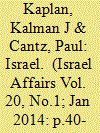

|
|
|
|
|
| Publication |
2014.
|
| Summary/Abstract |
Political attitudes towards the modern state of Israel are substantially influenced by underlying theological issues in Pauline Christianity regarding ethnic versus spiritual Israel. The very charge of Israel as occupier can be seen as an inverted perception or even a psychological projection emerging from the supersessionist view that the Pauline Church is the New Israel, displacing the Jewish people as God's elect. Hard and soft political charges of Israel as 'occupier' are discussed as are hard and soft claims of theological supersessionism. Dual covenant Christians tend not to espouse the view of Israel as occupier. Finally, these political and theological realms of thinking are linked in an attempt to bring psychological clarity to the peculiar nature of political projection towards the modern state of Israel, among Christians and even post-Christians in the West.
|
|
|
|
|
|
|
|
|
|
|
|
|
|
|
|
| 17 |
ID:
154289
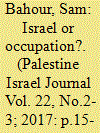

|
|
|
|
|
| Summary/Abstract |
Israel must choose now between peace with the dispossessed indigenous people of their state, or face another half-century of isolation with the backdrop of a rapidly encroaching demographical dilemma.
|
|
|
|
|
|
|
|
|
|
|
|
|
|
|
|
| 18 |
ID:
153008
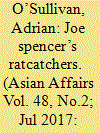

|
|
|
|
|
| Summary/Abstract |
During the Anglo-Soviet occupation of Persia (Iran), the Tehran-based Defence Security Office was responsible for protecting from Nazi subversion and sabotage three potential strategic targets: the vital oilfields, pipelines, and refineries of Khuzistan; the Lend-Lease supply route between the Persian Gulf and the Soviet Union; and the security of the Persian polity itself. Against all odds, under the command of Lt Col E.L. ‘Joe’ Spencer, this small but effective British/Indian security-intelligence unit succeeded in neutralising the Nazi threat, in capturing all German operatives on Persian soil, and in maintaining the security of a territory five times the size of Britain.
|
|
|
|
|
|
|
|
|
|
|
|
|
|
|
|
| 19 |
ID:
178337
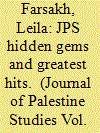

|
|
|
|
|
| Summary/Abstract |
Examining the Journal’s fifty-year trajectory documenting the political economy of Palestine and of the Palestinians (not one and the same), author Leila Farsakh highlights contributions by a rich mix of economists, anthropologists, and other scholars: from Yusif and Rosemary Sayigh, Sara Roy, George Abed, Raja Khalidi, and Linda Tabar to Darryl Li, Judith Gabriel, Nicholas Pelham, Sobhi Samour, Omar Jabari Salamanca, and Helga Tawil-Souri (to name only some). Taken together, Farsakh argues, their writings expose “the diversity of Palestinian economic realities,” and highlight the continuing relevance of the settler-colonial paradigm as “the most useful analytic for understanding the Palestinian economic predicament.” Far from being a neutral technocratic process, economic development is “embedded in power structures that need to be dissected and understood at both macro and micro levels.”
|
|
|
|
|
|
|
|
|
|
|
|
|
|
|
|
| 20 |
ID:
120379
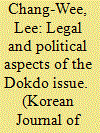

|
|
|
|
|
|
|
|